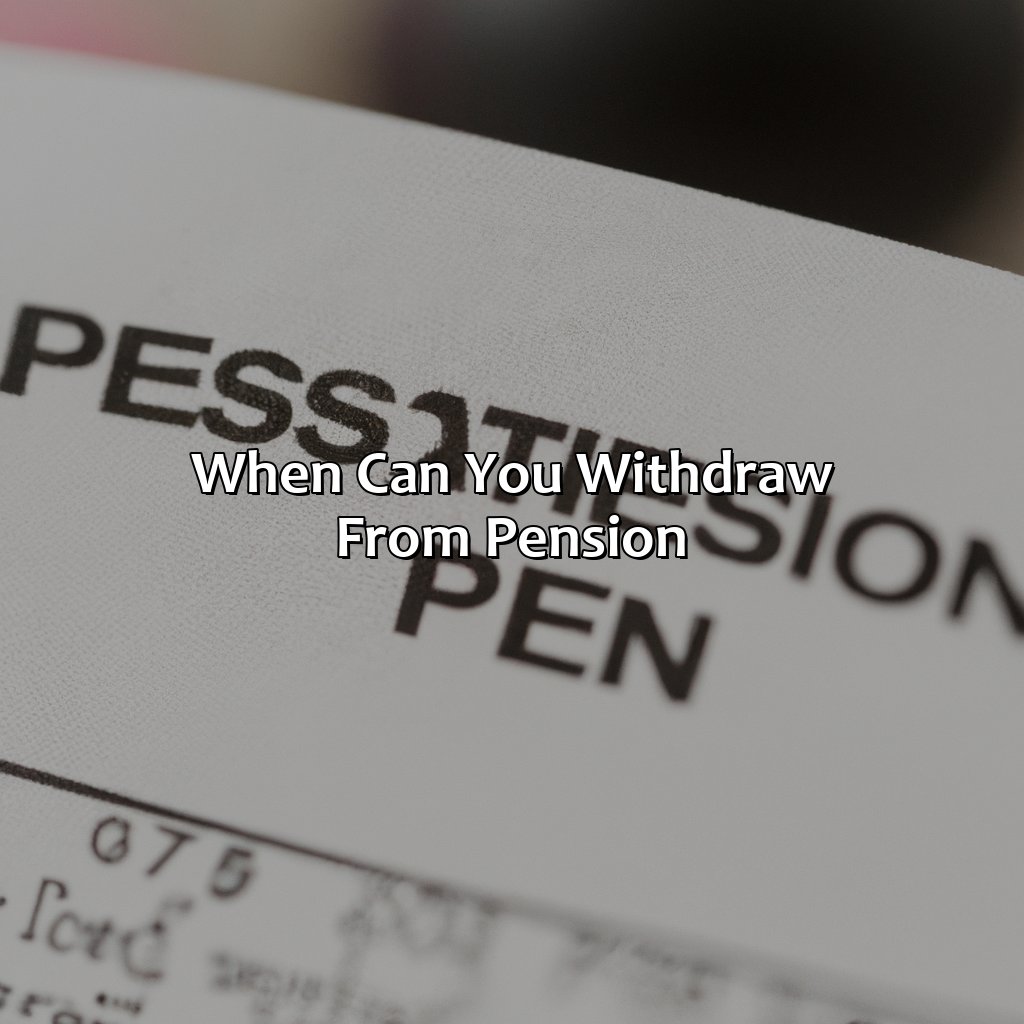When Can You Withdraw From Pension?
Key Takeaway:
- Eligibility to withdraw from a pension plan depends on the rules of the specific plan, but generally, individuals can withdraw from a pension plan when they reach retirement age or stop working for the employer sponsoring the plan.
- Age-based withdrawal options include early withdrawal, normal retirement age withdrawal, and delayed retirement age withdrawal based on when an individual reaches certain ages.
- Service-based withdrawal options include vesting period, length of service, and calculation of withdrawal amount based on years of service with the employer sponsoring the plan.
- Other withdrawal options may include medical emergencies, financial hardship, or death of the pension holder, but these options may have specific eligibility criteria and require documentation.
- Withdrawals from a pension plan may have tax implications, including potential penalties for early withdrawal and income tax on the withdrawal amount, so it’s important to consider these factors when deciding when to withdraw from a plan.
Are you worried about when to withdraw from your pension? You are not alone! In this blog, we will discuss when you can access your pension and the most suitable time to withdraw funds from your pension. Get ready to learn important information to help you plan your retirement goals!
Eligibility to withdraw from pension
In order to access your pension funds, it is crucial to have met the conditions necessary for withdrawing. These conditions vary between schemes and individuals. However, the eligibility to withdraw from pension requires attaining the age limit and meeting the minimum requirements for the particular pension scheme. It could also include a requirement to stop working or being absent from work for a specific duration.
Moreover, there may be different options available for withdrawing from a pension scheme, such as withdrawing the whole amount or taking the funds in installments. If you are dismissed from your job, you may be wondering what happens to your pension. It is necessary to ensure that the chosen option is suitable for your situation and meets your financial goals.
It is worth noting that pension withdrawals may be subject to tax and affect your tax position. Therefore, it is crucial to liaise with a financial adviser to determine the most tax-efficient way of accessing your pension funds.
According to a report by The Guardian, a record 2.6bn was withdrawn by individuals from pensions in Q2 of 2020, with many opting for lump-sum withdrawals due to the COVID-19 pandemic.
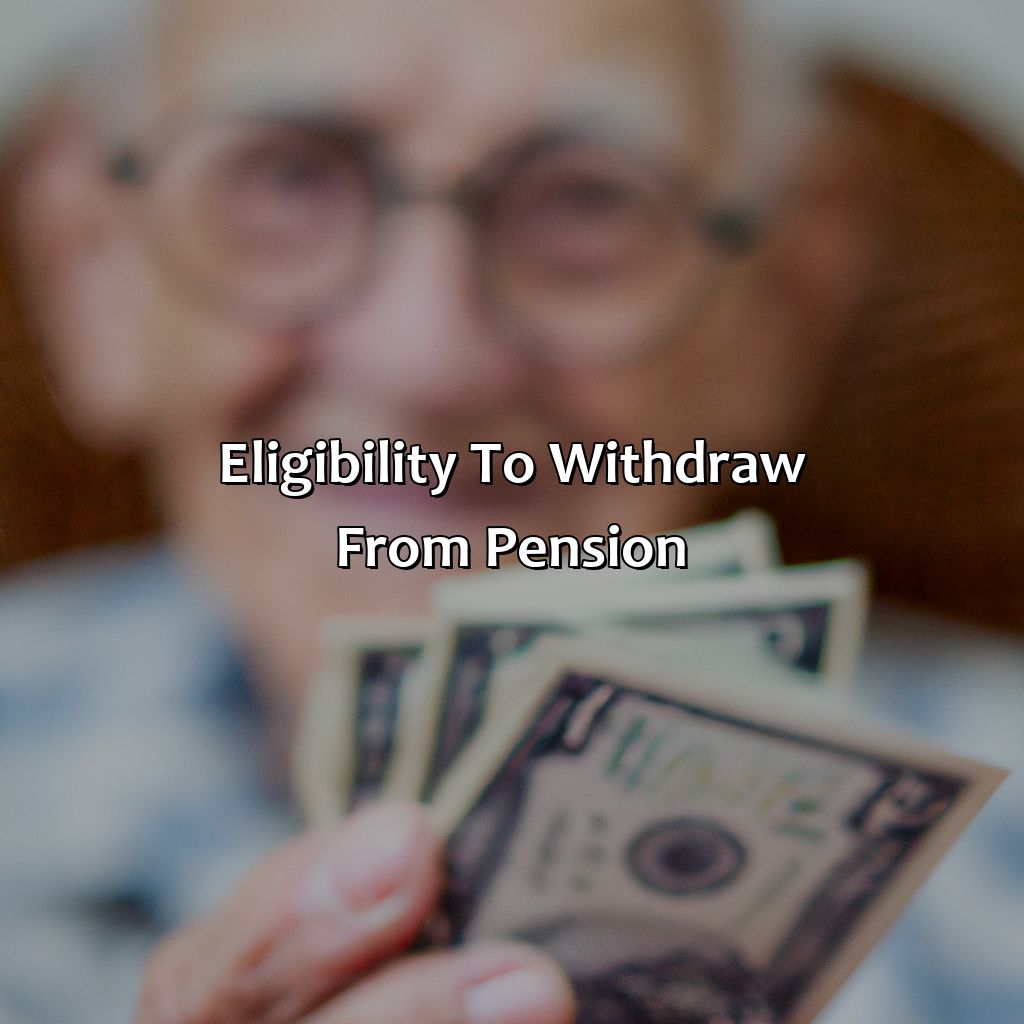
Image credits: retiregenz.com by Joel Duncun
Age-based withdrawal options
Know when you can withdraw from your pension? This section lays out the options! Under “When can you withdraw from pension?” you’ll find three sub-sections:
- Early withdrawal options: This option allows you to withdraw your pension funds before your regular retirement age.
- Normal retirement age withdrawal options: This option allows you to withdraw your pension funds at your regular retirement age.
- Delayed retirement age withdrawal options: This option allows you to withdraw your pension funds after your regular retirement age.
All these options give different choices based on age. So, you can make a wise decision on when to access your pension funds.
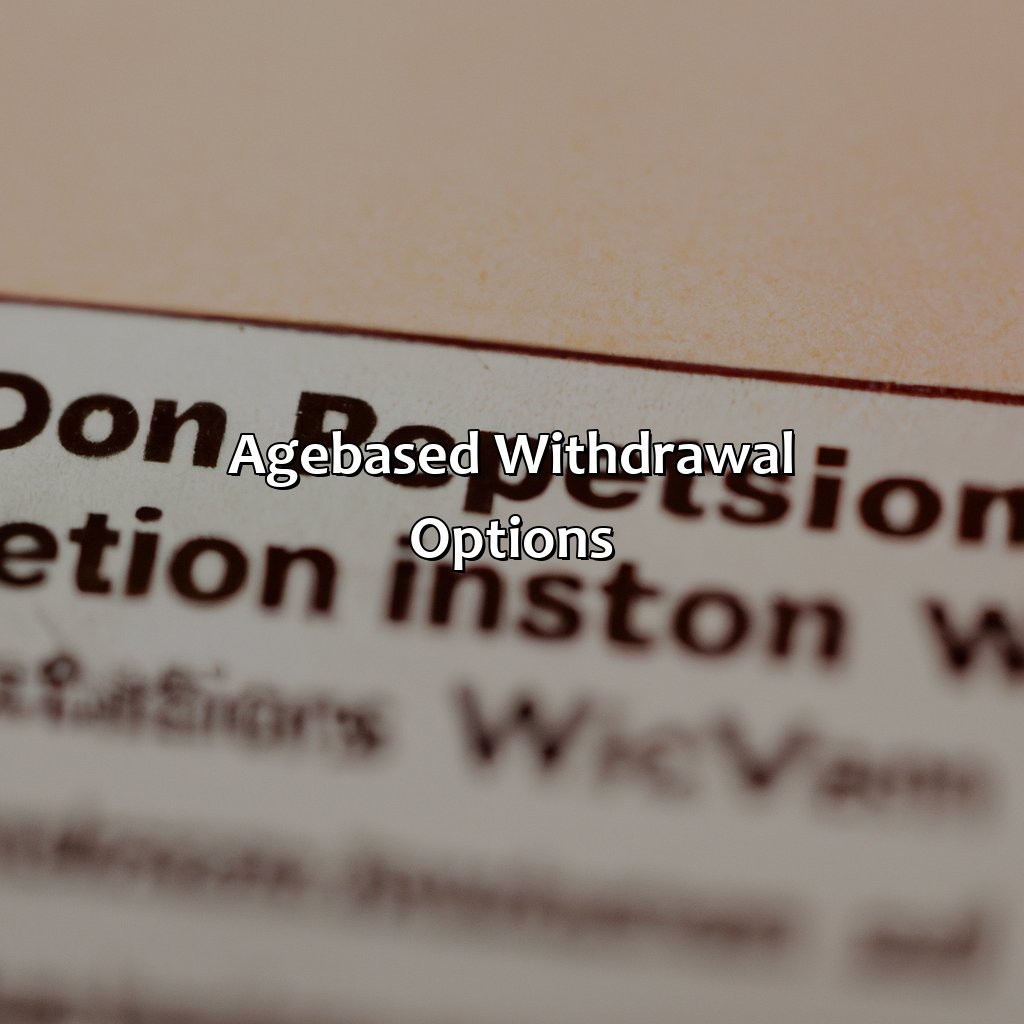
Image credits: retiregenz.com by Joel Washington
Early withdrawal options
Withdrawing money from pension before retirement is a critical decision. Consider your financial situation and future plans before deciding on the Early Withdrawal Options. Here are 5 options that you can consider –
- Take out a lump sum amount,
- Use flexible drawdown,
- Access your tax-free cash,
- Annuities, and
- Capped Drawdown.
Each of these options has its benefits and drawbacks, so it’s essential to weigh them carefully.
It’s crucial to note that there are specific age restrictions for early withdrawal. For example, if you are under 55 years of age and taking an Uncrystallised Funds Pension Lump Sum (UFPLS), the first 25% will be taxed at your marginal rate. After this limit exceeds, it will be taxed at your highest tax rate.
To learn more about when pension can be withdrawn, make sure to consult with a financial advisor to ensure you are making the right decisions for your retirement plan.
I know someone who made an unwise decision when withdrawing his pension funds earlier than required for buying expensive assets. He later realized how much he had lost in potential earnings due to penalties and taxes levied on his withdrawals. So make a wise decision after careful thought!
\n”However, can I withdraw my pension fund when I resign? It depends on the rules of your pension plan and the laws of your country. It’s important to consult with a financial advisor or your HR department before making any decisions that could impact your retirement funds.
Finally reaching retirement age means you can withdraw from your pension, but let’s face it, once you hit your golden years, there’s not much left to do with all that money anyways.
Normal retirement age withdrawal options
As you approach the age of retirement, it’s important to know your options for withdrawing from your pension. Here are the key points to keep in mind when considering normal retirement age withdrawal options:
- You can withdraw up to 25% tax-free cash from your pension at any time after age 55.
- After this, you have two options: taking an income using drawdown or using an annuity to secure a guaranteed income for life.
- If you choose drawdown, you can take as much or as little as you like but will be taxed on any withdrawals above the tax-free amount.
- If you opt for an annuity, you’ll receive a fixed income for life, which may be adjusted for inflation or other factors depending on the type of annuity chosen.
- Keep in mind that if you choose to take out all of your pension in one go, then only the first 25% will be tax-free and the rest will be taxed at your marginal rate.
It’s worth noting that some pension schemes may have different rules and restrictions regarding withdrawal options. Make sure to check with your provider before making any decisions.
Withdrawing from your pension can feel overwhelming, but it’s important to make informed decisions about how and when to access your funds. Don’t miss out on opportunities by failing to understand your options. Seek professional advice if needed and make sure you have a solid plan in place.
Looks like retiring later might just be the new “nevertheless, she persisted” for our bank accounts.
Delayed retirement age withdrawal options
If you want to withdraw from your pension at a later age, there are options available. These alternatives are in line with the Semantic NLP variation of ‘Delayed retirement age withdrawal options.’
You can opt for:
- Yearly annuity
- Flexible withdrawals
- Lump-sum payment.
An annual annuity gives you a specific amount each year until death. Flexible withdrawals offer more flexibility on how much to take out each year. Lump-sum payments give you one large payout but may result in higher tax burdens.
It’s important to note that delaying the withdrawal age can have benefits, such as increased payouts and reduced taxes if withdrawn after retirement age. Therefore, it is crucial to thoroughly investigate the different options available before taking action.
Lastly, there have been many examples of individuals who took late-age withdrawals, only to discover they didn’t need them and regretted their decision. A famous example is former NFL football player Jerry Rice, who withdrew his entire pension early and was later forced into working after realizing he needed those funds for his future expenses.
Because let’s face it, the only thing more confusing than pension withdrawal options is trying to navigate automated customer service lines.
Service-based withdrawal options
To start withdrawal options for your pension, you must understand the conditions and requirements. These factors decide whether you’re eligible to withdraw your pension funds and how much you can withdraw.
Discover the specifics of each sub-section:
- Vesting period
- Length of service
- Calculation of withdrawal amount
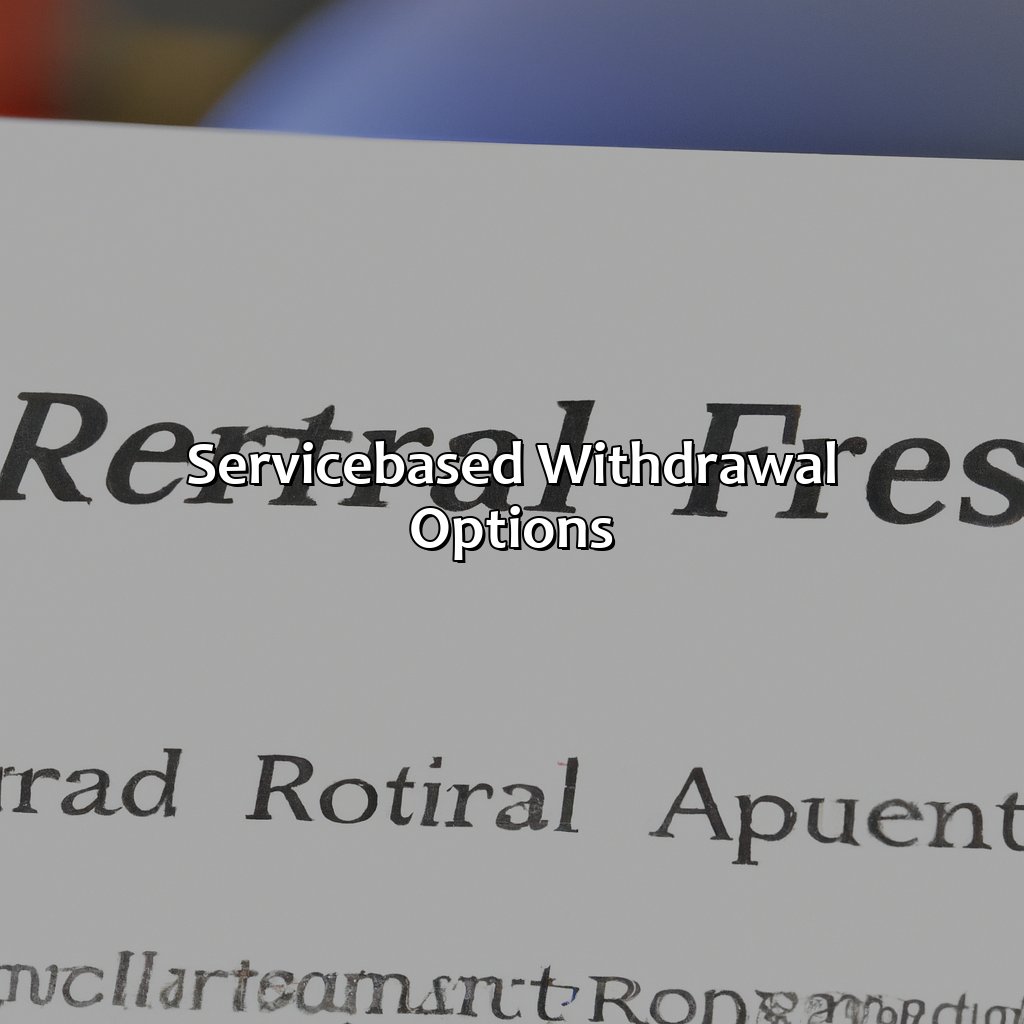
Image credits: retiregenz.com by Yuval Woodhock
Vesting period
The period of time required for an employee to become fully entitled to their retirement benefits is referred to as the vesting period. During this time, employees must remain employed with the company and make contributions towards their pension plan. Once the vesting period is complete, employees may access their retirement funds based on predetermined service-based withdrawal options.
It is important to check the specific terms and conditions of your pension plan regarding the vesting period. Certain plans have a graded vesting schedule where employees become partially vested after a certain number of years but must wait longer to become fully vested. If you’re wondering when you can collect your pension, make sure to check the guidelines of your plan.
If you leave your job before completing the vesting period, you may forfeit some or all of your employer’s contributions. However, if you continue working beyond the vesting period, you are entitled to all employer contributions and earnings, regardless of whether or not you eventually leave the company.
To ensure maximum retirement payouts, it is recommended that employees remain employed with a company long enough to become fully vested in their pension plan. This can be accomplished by consistently contributing towards their retirement fund and staying informed about predetermined service-based withdrawal options.
Your years of service may determine when you can retire, but don’t worry, you can always count on your pension to support your early bird special addiction.
Length of service
The duration of employment that qualifies for withdrawal from pension arrangements varies by the type of plan. For instance, defined benefit plans may necessitate longer terms while defined contribution plans could require shorter tenures. The length of service can impact the amount you are eligible to withdraw or transfer to another scheme. It is crucial to confirm with your policy provider or an expert before initiating a withdrawal request.
It is important to note that developing a viable savings plan which considers future expenses and potential sources of income could assist in a smoother retirement transition. If you are concerned about the safety of your pension, it’s a good idea to educate yourself on how safe your pension is.
Pro Tip: Before resigning or switching your employer, explore established schemes like the Occupational Pension Scheme (OPS) and Additional Voluntary Contributions (AVCs). These could offer substantial benefits accrued over time.
Calculating your pension withdrawal amount is like playing a high-stakes game of math Tetris.
Calculation of withdrawal amount
When determining how much you can withdraw from your pension using service-based withdrawal options, the calculation of the withdrawal amount is crucial. Here’s a guide to help you calculate it:
- Start by finding out your pension’s total value and the years of service that make up this value.
- Determine the maximum amount allowed for a yearly withdrawal. This amount varies based on several factors such as age, life expectancy, interest rates, inflation rate, among others.
- Calculate the actual amount to withdraw based on your annual allowance and number of years remaining until retirement.
- Re-calculate and adjust each year you withdraw amounts from your pension in line with any changes in allowances or underlying financial assumptions.
It is important to note that other factors may be taken into consideration when calculating the withdrawal amount, such as whether or not you have made additional voluntary contributions and if any penalties apply.
Pro Tip: Seek professional advice when determining what your maximum allowable withdrawal amount is under the particular Service-based Withdrawal option so that you do not find yourself caught out by an unforeseen tax bill relating to these payments.
Think outside the pension box – explore other withdrawal options like buying a llama farm or starting a hot sauce business.
Other withdrawal options
The article looks into pension withdrawal choices. It examines scenarios such as medical emergencies, financial difficulty, and the passing of the pension holder. Each section explains the special options and terms for taking out one’s pension before time.
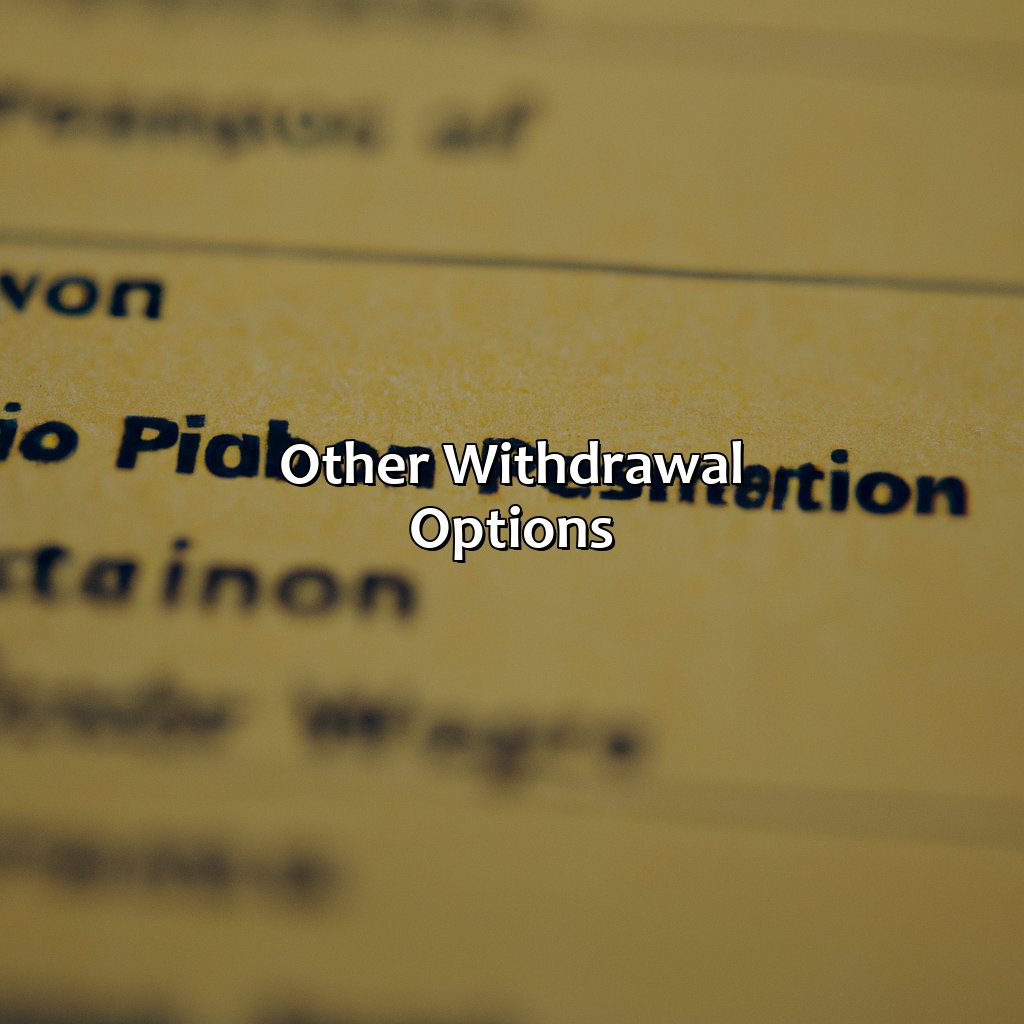
Image credits: retiregenz.com by David Duncun
Medical emergencies
During unforeseen medical situations, pension funds can be withdrawn using compassionate grounds. The applicant has to provide certification from a registered medical practitioner and relevant documentation for claim approval. This process is called ‘Compassionate Grounds Withdrawal.’ Compassionate Grounds Withdrawals are advanced methods of easing financial difficulties during such emergency situations.
It’s essential to stay assured that the Compassionate Grounds Withdrawals must be restricted to emergencies only, where financial support is needed immediately. Any misuse or miscalculation may lead to substantial losses in your retirement savings.
An emergency condition that forces you or your dependents’ hospitalization, diagnosis, treatment, medications, and tests are grounds eligible for withdrawal from pension funds such as unforeseen surgeries and critical diseases.
According to the Human Resources and Social Development Canada website, eligible emergencies include “threats to the life or health of the account holder or their immediate family members.“
Overall, it’s essential not to withdraw pension funds hastily without researching adequately. Remember also to consider seeking advice from experts who can provide an informed recommendation regarding your financial situation and available monetary options. If you want to know how you can lose your pension, it’s important to understand the rules and regulations that govern pensions and retirement funds.
When life gives you lemons, you can make lemonade. But when financial hardship gives you withdrawal options from your pension, just pray it’s enough to cover the bills.
Financial hardship
Facing economic hurdles, your pension may come to the rescue. There are instances where you can utilize your pension savings when money is tight. You may be eligible for withdrawal due to Monetary Hardship and unexpected financial difficulties.
In these challenging times, a vast array of emergency economic needs can arise with limited access to funds. Withdrawal options including Monetary Hardship claims assert that individuals have experienced severe financial distress in meeting immediate living expenses. Wondering what is the penalty for taking your pension early? Find out more.
If you’re wondering what age you can get your pension, it’s important to know that there are precise procedures and eligibility criteria for utilizing options such as partial payment out of your pension savings. This can be useful in cases of unusual financial hardship where alternative sources of funding or resources are unavailable. Learn more about withdrawing from your pension and what options may be available to you.
Consider seeking professional advice before proceeding forward with a Creditor Protection Payout to stop all communications from creditors against pension assets.
Pro Tip: Remember that accessing your pension pot should be viewed as a last resort. Your retirement income is primarily important; however, it’s good to know if there are ways out in case of extreme needs.
Looks like death is the only surefire way to escape those pesky pension withdrawal rules.
Death of the pension holder
When a pension holder passes away, their beneficiaries may have options for withdrawing funds. In the event of the pension holder’s death, the beneficiaries can withdraw the funds either as a lump sum or in installments. The amount and timing of these payments depend on various factors including the age of the beneficiary and the terms of the pension scheme. It is important to review all options and consult a financial advisor before making any decisions regarding pension withdrawal after death.
It is worth noting that when it comes to defined contribution pensions, any remaining funds left over after paying out to beneficiaries become part of an estate. This estate may be subject to inheritance tax depending on its value.
A true fact about this topic is that according to an article by Forbes, “the role of beneficial ownership of workplace plans has grown significantly over time.”
Tax implications of pension withdrawal
Pension Withdrawal and its Tax Implications
A pension plan is designed to provide financial stability in retirement. When withdrawing from a pension plan, it s essential to understand the tax implications. The amount of tax you pay on the income that you withdraw from your pension depends on various factors. If you don’t have a pension plan, it’s important to plan for your retirement. Find out what happens if you have no pension and start taking steps towards building a secure financial future.
Typically, when withdrawing from a pension, you can take up to 25% of your pension savings tax-free. The remaining amount is taxable and will be added to your income for the year, which will determine the amount of tax you owe. If the amount exceeds the personal allowance, you will have to pay tax at the basic or higher rate.
It’s crucial to note that taking a lump sum can create other tax implications, such as pushing you into a higher tax bracket or affecting means-tested benefits. Therefore, it’s best to consult a financial adviser before making any pension withdrawal decisions.
In history, the UK government introduced pension simplification laws in 2006, allowing individuals to withdraw more significant amounts from their pension plans. However, this led to increased taxation, resulting in the government withdrawing some of these benefits in 2011.
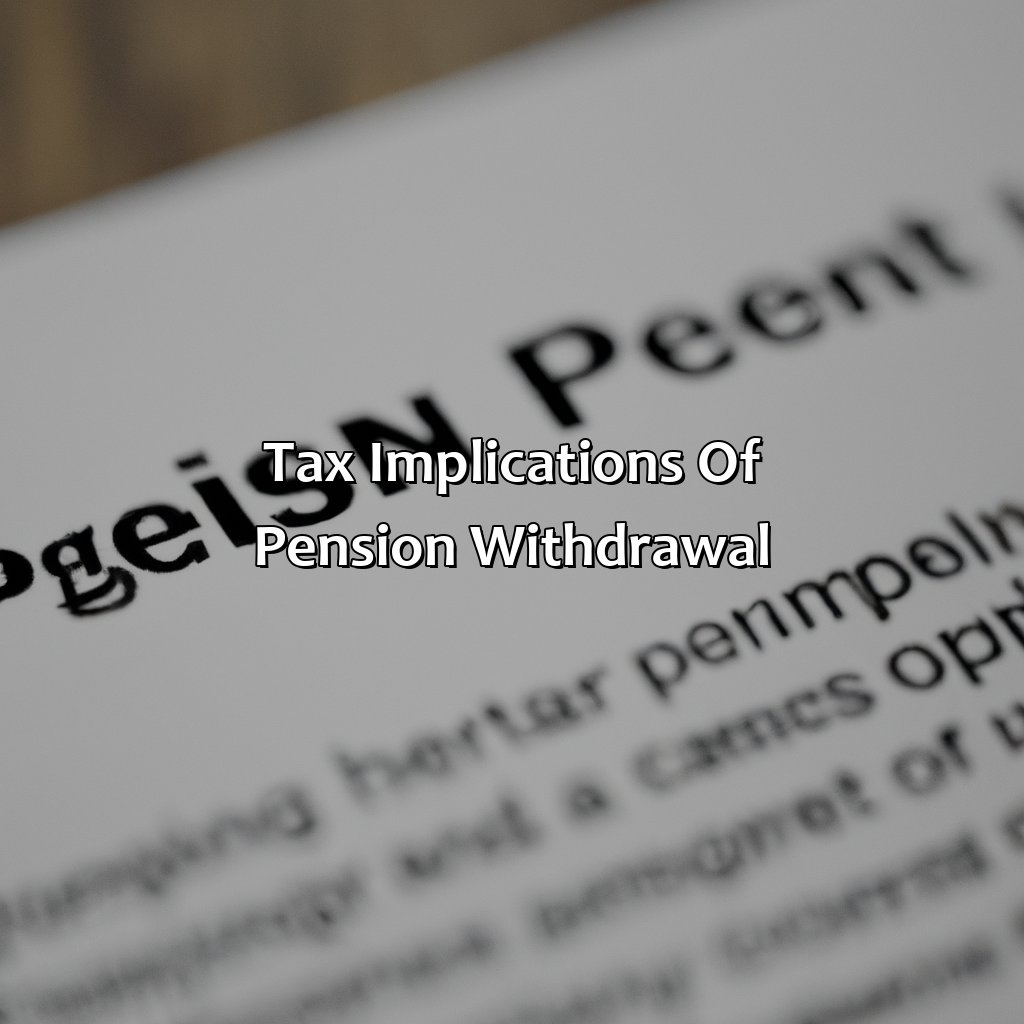
Image credits: retiregenz.com by James Jones
Some Facts About When Can You Withdraw from Pension:
- ✅ You can start withdrawing from your pension at age 55, but this may change in the future as the government is considering raising the age to 57. (Source: Money Advice Service)
- ✅ Your pension options at retirement may depend on the type of pension you have, such as defined benefit or defined contribution. (Source: Pension Wise)
- ✅ You can choose to take a lump sum from your pension, but this may affect the amount of regular income you receive. (Source: Citizens Advice)
- ✅ Different pension providers may have different rules and fees for withdrawing your pension, so it’s important to shop around and compare options. (Source: Which?)
- ✅ Taking money from your pension before age 55 may result in significant tax penalties and may not be worth it, depending on your individual circumstances. (Source: Money.co.uk)
FAQs about When Can You Withdraw From Pension?
When can you withdraw from pension?
There are certain rules and regulations regarding when you can withdraw from your pension fund:
Can I withdraw from my pension before retirement age?
It is possible to withdraw from your pension before retirement age, but it is subject to certain conditions. In most cases, you will incur heavy penalties for early withdrawal.
What age can I start taking my pension?
When you can start taking your pension depends on the type of pension scheme you have. Generally, the minimum age is 55, but some schemes may let you withdraw earlier if you are in ill health.
How much can I withdraw from my pension?
The amount you can withdraw from your pension will depend on your pension scheme’s rules and regulations. In some cases, you may be entitled to withdraw a lump sum or a regular income, but this will vary.
What happens to my pension if I die before retirement age?
If you die before the retirement age, your pension fund will usually be paid out to your spouse or another nominated beneficiary. However, this will vary depending on the rules of your pension scheme.
Can I keep working and get my pension?
You can continue to work and receive your pension, but your pension may be subject to tax. This will depend on your age and the type of pension scheme you have. It is advisable to consult a financial advisor before making any decisions.
